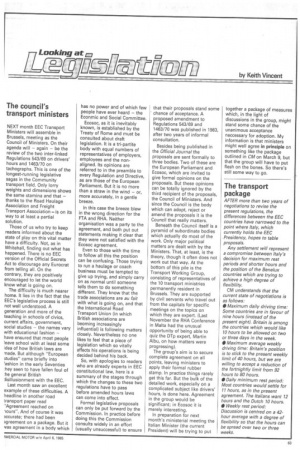The council's transport ministers
Page 65

If you've noticed an error in this article please click here to report it so we can fix it.
NEXT month EEC Transport Ministers will assemble in Brussels, meeting as the Council of Ministers. On their agenda will — again — be the review of the two inter-linked Regulations 543/69 on drivers' hours and 1463/70 on tachographs. This is one of the longest-running legislative sagas in the Community transport field. Only lorry weights and dimensions shows the same stamina and that — thanks to the Road Haulage Association and Freight Transport Association—is on its way to at least a partial solution.
Those of us who try to keep readers informed about the state of play on this vital matter have a difficulty. Not, as in Whitehall, finding out what has happened. There is no EEC version of the Official Secrets Act to discourage any Eurocrat from telling all. On the contrary, they are positively encouraged to let the world know what is going on.
The difficulty is much nearer home. It lies in the fact that the EEC's legislative process is still not well understood. A generation and more of the teaching in schools of civics, current affairs, government, social studies — the names vary with educational fashion — have ensured that most people leave school with at least some Idea of how British laws are made. But although "European 3tudies" came briefly into 'ashion in the early Seventies :hey seen to have fallen foul of he general British iisillusionment with the EEC. Last month saw an excellent example of these difficulties. A headline in another road transport paper read 'Agreement reached on lours". And of course it was accurate; there had been agreement on a package. But it as agreement in a body which has no power and of which few people have ever heard — the Econmic and Social Committee.
Ecosoc, as it is inevitably known, is established by the Treaty of Rome and must be consulted about draft legislation. It is a tri-partite body with equal numbers of representatives of employers, employees and the nonaligned. Its opinions are referred to in the preamble to every Regulation and Directive, as are those of the European Parliament. But it is no more than a straw in the wind — or, more accurately, in a gentle breeze.
In this case the breeze blew in the wrong direction for the FTA and RHA. Neither organisation was a party to the agreement, and both put out statements making it clear that they were not satisfied with the Ecosoc agreement.
Even to those with the time to follow all this the position can be confusing. Those trying to run a haulage or coach business must be tempted to give up trying, and simply carry on as normal until someone tells them to do something different. They know that the trade associations are au fait with what is going on, and that the International Road Transport Union (in which British associations are beoming increasingly influential) is following matters closely. Nevertheless no one likes to feel that a piece of legislation which so vitally affects his operations is being decided behind his back.
So, with apologies to readers who are already experts in EEC constitutional law, here is a summary of the stages through which the changes to these two regulations have to pass before amended hours laws can come into effect.
Formal legislative proposals can only be put forward by the Commission. In practice before doing this the Commission consults widely in an effort (usually unsuccessful) to ensure that their proposals stand some chance of acceptance. A proposed amendment to Regulations 543/69 and 1463/70 was published in 1983, after two years of informal consultation.
Besides being published in the Official Journal the proposals are sent formally to three bodies. Two of these are the European Parliament and Ecosoc, which are invited to give formal opinions on the proposals. But these opinions can be totally ignored by the third recipient of the proposals, the Council of Ministers. And since the Council is the body which can adopt, reject or amend the proposals it is the Council that really matters.
Beneath the Council itself is a pyramid of subordinate bodies which actually do most of the work. Only major political matters are dealt with by the Ministers. That, at least, is the theory, though it often does not work out that way. At the bottom of this pile is the Transport Working Group, consisting of representatives of the 10 transport ministries permanently resident in Brussels. They are supported by civil servants who travel out from the capitals for specific meetings on the topics on which they are expert. (Last November the RHA Conference in Malta had the unusual opportunity of being able to quiz the DTp expert, Martin Albu, on how matters were progressing).
The group's aim is to secure complete agreement on all points, leaving ministers to apply their formal rubber stamp. In practice things rarely get this far. But the bulk of the detailed work, especially on a complicated subject like drivers' hours, is done here. Agreement in the group would be significant; in Ecosoc it is merely interesting.
In preparation for next month's ministerial meeting the Italian Minister (the current President) will be trying to put together a package of measures which, in the light of discussions in the group, might stand some chance of the unanimous acceptance neccessary for adoption. My information is that ministers might well agree in principle on something like the package outlined in CM on March 9, but that the group will have to put flesh on the bones. So there's still some way to go.




























































































